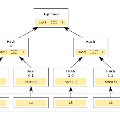Popular Ethereum wallets (e.g., MetaMask) entrust centralized infrastructure providers (e.g., Infura) to run the consensus client logic on their behalf. As a result, these wallets are light-weight and high-performant, but come with security risks. A malicious provider can completely mislead the wallet, e.g., fake payments and balances, or censor transactions. On the other hand, light clients, which are not in popular use today, allow decentralization, but at inefficient linear bootstrapping complexity. This poses a dilemma between decentralization and performance. In this paper, we design, implement, and evaluate a new proof-of-stake (PoS) superlight client with logarithmic bootstrapping complexity. Our key insight is to leverage the standard existential honesty assumption, i.e., that the verifier (client) is connected to at least one honest prover (full node). The proofs of PoS take the form of a Merkle tree of PoS epochs. The verifier enrolls the provers in a bisection game, in which the honest prover is destined to win once an adversarial Merkle tree is challenged at sufficient depth. We implement a complete client that is compatible with mainnet PoS Ethereum to evaluate our construction: compared to the current light client construction proposed for PoS Ethereum, our client improves time-to-completion by 9x, communication by 180x, and energy usage by 30x. We prove our construction secure and show how to employ it for other proof-of-stake systems such as Cardano, Algorand, and Snow White.
翻译:流行的 Eceenum 钱包( 如 MetaMask ), 委托中央基础设施提供者( 如 Infura ) 代表他们执行协商一致客户逻辑。 因此, 这些钱包是轻量和高性能的, 但也带有安全风险。 恶意提供者可以完全误导钱包, 例如假付款和余额, 或者审查交易。 另一方面, 轻型客户, 现不为大众使用, 允许权力下放, 但低效的线性靴复杂性。 这在权力下放和业绩之间造成了两难。 在本文中, 我们设计、 实施和评估一个新的验收证明( POS ) 超级光灯客户, 具有对数的靴子复杂性。 我们的关键洞察力是利用标准的存在诚实诚实的假设, 比如, 假付款和平衡, 或者审查交易交易。 而POS 的证明书则以白树的形式提出Posepochs 的证明。 校验者在双节游戏中注册了验证员 。 在这场游戏中, 诚实地证明我们客户 Ernal- dealx 的购买了我们目前的精度 30, 一旦购买了我们的主要造价, 我们的客户将赢得了我们的造价。



